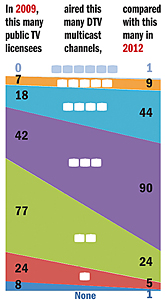Tag: Mike Starling
Friday roundup: WYPR union effort stalls; Downton Abbey reportedly bans modern undies
Plus: Mike Starling starts an LPFM station, and NPR's creative director talks about her work process.Multicasts tailored to local priorities
Bolstered by ratings data on their digital multicast channels and years of experience in managing them, public TV station programmers in many ...PubTV multicaster V-me faulted for airing ‘ordinary commercials’
V-me, the Spanish-language multicast channel carried by 42 public TV stations, pulled underwriting spots from its schedule last month amid complaints about ...New channel in Pittsburgh: All-pledge, all the time
WQED has come up with an idea that initially might make some public broadcasters cringe: an entire multichannel fully devoted to fundraising. Yes, ...World multicast channel: an incubator for diversity?
WGBH and WNET are “re-imaging and re-engineering” the PBS World documentary-oriented multicast channel, which has been picked up by only about 40 ...Many stations packaging their own kids’ channels
With the all-digital future arriving, if haltingly, and a bigger share of viewers likely to come through DTV multicast channels, ...



